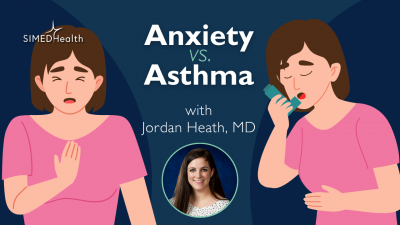
Anxiety vs. Asthma
Distinguishing anxiety from asthma can be difficult due to overlapping symptoms, such as shortness of breath, chest tightness, and cough. Dr. Jordan Heath, a SIMEDHealth Allergy & Asthma physician identifies the signs and symptoms of anxiety and asthma, how stress also affects those with asthma, and when to reach out to your physician about breathing problems.
Dr. Jordan Heath helps patients improve their quality of life by diagnosing and treating allergic conditions, including asthma, seasonal allergies, food allergies and intolerances, and skin rashes.
To learn more about Jordan Heath, MD, click here.
To schedule an appointment with SIMEDHealth Primary Care or Allergy & Asthma, click here.
1. What are signs and symptoms of asthma?
Asthma symptoms can vary patient to patient, but most commonly include wheezing, cough, shortness of breath and chest tightness. Signs can also include wheezing, and when severe is sometimes associated with decreased oxygen saturation. Difficulty moving air through the chest can also be observed on physical exam.
2. Are there anxiety symptoms that can mimic asthma?
Absolutely. Most commonly would be shortness of breath, but anxiety can also cause chest tightness and in rare cases cough. Many of the symptoms can crossover which can make it challenging to differentiate between the two.
3. How can one tell if their breathing problems are caused by asthma or anxiety?
Telling asthma and anxiety apart can sometimes be difficult.With anxiety, patients most often have difficulty breathing in, that is, difficulty on inspiration. With asthma, patients have difficulty breathing out, expiration. Asthma is an obstructive lung disease causing more problems with trapping air in (difficulty with expiration), rather than trouble getting air inside the lungs (inspiration). Anxiety can also be associated with a specific disorder called vocal cord dysfunction that has the characteristic inspiratory shortness of breath resulting in not being able to take a full breath. Sometimes, we can differentiate between these two with spirometry or pulmonary function testing in clinic.
4. Can stress or anxiety trigger an asthma attack?
While asthma is not caused by stress or anxiety, having either of these can definitely make asthma worse, or heighten air awareness, which in turn makes the breathing and anxiety worse.
5. What questions should a patient ask their physician, if they’re having symptoms of anxiety or asthma?
I think the most important thing to ask is if further workup or treatment is needed. Sometimes we are able to start with simple breathing tests that can point us in the correct direction, while for others we start with assessments that can be completed at home. However, it is important to mention the symptoms you are having to ensure the source is evaluated and treated appropriately. Both the unknown and lack of treatment plan can worsen anxiety, and it is always better to be prepared. Ask if inhaler therapy is appropriate or if it is unlikely to help.